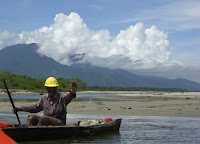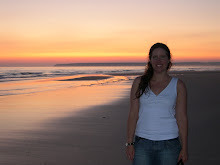 Supersize! The Hondurans were amazed that they could fit a whole person in each leg of these scrub pants that were donated.
Supersize! The Hondurans were amazed that they could fit a whole person in each leg of these scrub pants that were donated. Friday, September 21, 2007
Really big scrubs...
 Supersize! The Hondurans were amazed that they could fit a whole person in each leg of these scrub pants that were donated.
Supersize! The Hondurans were amazed that they could fit a whole person in each leg of these scrub pants that were donated. Tarantula!!!

I awoke with an itchy toe, realizing something had bit me. I turned on the light and glanced at the clock. It was midnight. For some reason I remembered that I had not checked under my bed that night for bugs. As I hung my head over the edge of the bed, my breath caught in my throat at the sight before me. I blinked my eyes several times and wondered if I was dreaming. Then it moved. One huge, long, hairy leg after another, walking toward me. I’ve never seen a tarantula so big!!!! I yelped and called out to Amy that there was a tarantula under my bed. So, there we were, both bleary eyed, standing on our beds, wondering what to do! We ended up putting on our hiking boots, finding brooms and sticks and bowls and chasing the silly thing out  from under the bed, then out from under the dresser and finally trapping it under a bowl. It was quite the ordeal and involved much jumping from one bed to another. Talk about adrenaline! We scooted the bowl outside and put a large brick on top of it. The next day we watched it bake in the sun.
from under the bed, then out from under the dresser and finally trapping it under a bowl. It was quite the ordeal and involved much jumping from one bed to another. Talk about adrenaline! We scooted the bowl outside and put a large brick on top of it. The next day we watched it bake in the sun.
 from under the bed, then out from under the dresser and finally trapping it under a bowl. It was quite the ordeal and involved much jumping from one bed to another. Talk about adrenaline! We scooted the bowl outside and put a large brick on top of it. The next day we watched it bake in the sun.
from under the bed, then out from under the dresser and finally trapping it under a bowl. It was quite the ordeal and involved much jumping from one bed to another. Talk about adrenaline! We scooted the bowl outside and put a large brick on top of it. The next day we watched it bake in the sun.Cayos Cochinos Islands



I had this weekend off, so Amy and I went on a little adventure to the Cayos Cochinos which are some tiny islands just off the coast here. We have a lot of patients from there and they have no consistent medical care there. They have a nurse 3 mo out of the year on the big island, otherwise they have to take a boat to the mainland to see a doctor. We took a very small blue canoe with an outboard motor out on the open ocean with fisherman, Malaquias. We put-putted for 1 1/2 hrs to get  there. (In a large boat it only takes 45 min.) Malaquias was bailing water the whole time and we were praying for no waves higher than the 6 inches that we were sticking out of the water!!!
there. (In a large boat it only takes 45 min.) Malaquias was bailing water the whole time and we were praying for no waves higher than the 6 inches that we were sticking out of the water!!!
 there. (In a large boat it only takes 45 min.) Malaquias was bailing water the whole time and we were praying for no waves higher than the 6 inches that we were sticking out of the water!!!
there. (In a large boat it only takes 45 min.) Malaquias was bailing water the whole time and we were praying for no waves higher than the 6 inches that we were sticking out of the water!!!We stayed on a tiny little island called Chachajuate, about the size of a football field, where anywhere from 60-120 people live in little huts on the sand. There are fishing boats all around and plenty of hammocks. They recently put in a composting toilet, but I think they still "do their business" in the ocean most of the time. There is a lock on the toilet, so anytime you want to take a dump,  you have to go find the "keeper of the keys". I guess she could give you a pretty good account of everyone's bowel habits! :) Anyway, we stayed in a little "cabana" for $4 per night. It was just a rickety bed on a sand floor, with wooden walls and open windows overlooking the sea. We could hear the waves all night! It was lovely. We learned a lot about the Garifuna people and hope to eventually start monthly trips to the islands to provide medical care and education.
you have to go find the "keeper of the keys". I guess she could give you a pretty good account of everyone's bowel habits! :) Anyway, we stayed in a little "cabana" for $4 per night. It was just a rickety bed on a sand floor, with wooden walls and open windows overlooking the sea. We could hear the waves all night! It was lovely. We learned a lot about the Garifuna people and hope to eventually start monthly trips to the islands to provide medical care and education.
 you have to go find the "keeper of the keys". I guess she could give you a pretty good account of everyone's bowel habits! :) Anyway, we stayed in a little "cabana" for $4 per night. It was just a rickety bed on a sand floor, with wooden walls and open windows overlooking the sea. We could hear the waves all night! It was lovely. We learned a lot about the Garifuna people and hope to eventually start monthly trips to the islands to provide medical care and education.
you have to go find the "keeper of the keys". I guess she could give you a pretty good account of everyone's bowel habits! :) Anyway, we stayed in a little "cabana" for $4 per night. It was just a rickety bed on a sand floor, with wooden walls and open windows overlooking the sea. We could hear the waves all night! It was lovely. We learned a lot about the Garifuna people and hope to eventually start monthly trips to the islands to provide medical care and education. Losing a patient
9/12/07
We just lost a patient this afternoon. She was struck by lightning near the river while bathing her child. She was immediately unconscious. It took them 15-20 min to get here, no CPR. On arrival she was cold and unresponsive, no breathing, no heartbeat, no pulse. We did CPR, got an IV, gave meds and she finally had cardiac rythm. We intubated, gave more meds. The EKG shows a huge inferior myocardial infarction. (common in lightning strikes per our cardiologist). We worked on her for two hours but she never took a breath or responded. The worst is that we have no ventilator here, no ICU, no way to transport her safely to La Ceiba. They say that she would likely not make it to town (the ambulance is a truck with no trained personnel) and even if she did make it with a heartbeat, the track record in La Ceiba is very poor for any critically ill patient surviving. We discussed taking turns bagging her (ventilating her by hand) overnight but our director vetoed that. It is likely that she didn't have oxygen to her brain for 20, maybe 30 minutes. We finally had to call it. She left behind a husband and six children. She was only 34 yrs old.
We just lost a patient this afternoon. She was struck by lightning near the river while bathing her child. She was immediately unconscious. It took them 15-20 min to get here, no CPR. On arrival she was cold and unresponsive, no breathing, no heartbeat, no pulse. We did CPR, got an IV, gave meds and she finally had cardiac rythm. We intubated, gave more meds. The EKG shows a huge inferior myocardial infarction. (common in lightning strikes per our cardiologist). We worked on her for two hours but she never took a breath or responded. The worst is that we have no ventilator here, no ICU, no way to transport her safely to La Ceiba. They say that she would likely not make it to town (the ambulance is a truck with no trained personnel) and even if she did make it with a heartbeat, the track record in La Ceiba is very poor for any critically ill patient surviving. We discussed taking turns bagging her (ventilating her by hand) overnight but our director vetoed that. It is likely that she didn't have oxygen to her brain for 20, maybe 30 minutes. We finally had to call it. She left behind a husband and six children. She was only 34 yrs old.
Tuesday, September 18, 2007
Machete Wounds

How is it that one tool can keep us doctors so busy? Perhaps because every Honduran and their dog owns a machete or two or three and never leaves home without it. They carry their trusty machete everywhere...walking down the road, working in the fields (obviously), riding on a bicycle, hopping in the back of a truck, under their pillow at night... I admit it is an incredibly useful tool. It is used mainly in the fields for working with crops, but also comes in handy for gathering firewood, cutting grass, cutting rope or string, chopping the head off a snake, cutting up meat or veggies (the all-round super-size cooking knife), self defense weapon...and the list goes on. Since Hondurans carry this tool with them and leave them lying about their homes, I spend several hours per week sewing up machete wounds. Most of them are accidents. The kid tripped over the machete lying about in the kitchen. A man mistook his leg for the plant he was cutting down. The five people riding on one bicycle fell over and someone landed on their machete. However, other docs have seen some very serious wounds inflicted during drunken brawls where machete wielding is common. All this to say that the "Honduran household tool" is causing a steady improvement in my suturing skills. Good thing I like to sew!
Hurricane Felix


Praise the Lord it passed us by! We had battened down the hatches, bagged up valuables, moved furniture away from windows, and were getting ready to move patients around in the hospital when we received news that Hurricane Felix had changed course and was moving through central Honduras rather than along the coast. It hit Nicaragua as a Category 5 and caused great damage, but as it turned inland, it hit the mountains of central Honduras and transitioned into a mere Tropical Storm. What a relief! Lots of rain and a few power outages is all we suffered. I consider all the scrambling about and hurricane preparation as good practice for the next one. Hurricane Season is just beginning!
Subscribe to:
Comments (Atom)

